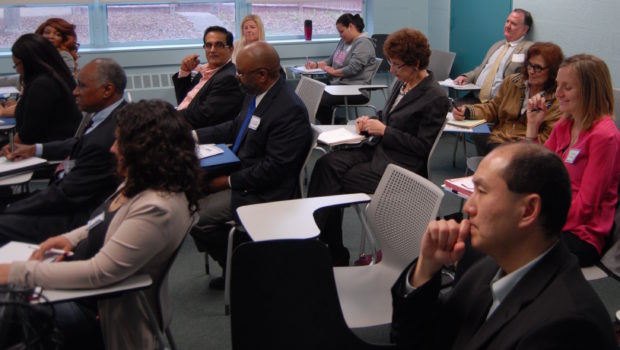WORCESTER – Some of the best and brightest involved in operating small businesses participated in the Worcester Regional Chamber of Commerce’s Woostapreneurs Forum during the recent National Small Business Week at Worcester State University.
Sponsored in concert with the U.S. Small Business Administration, the event attracted almost 200 small business owners, budding entrepreneurs and students as well as 12 expert panelists and breakout workshop leaders. Forum supporters from local banking and lending institutions including Commerce Bank, Fidelity Bank, UniBank, Spencer Bank, Hometown Bank, Southbridge Savings Bank, TD Bank, United Bank, Webster Five, Rollstone Bank & Trust and Bank of America added information sharing kiosks as an attractive backdrop to this first-of-its-kind event.
In opening the forum, Worcester State University President Barry M. Maloney called the city’s recently developed entrepreneur incubation labs and co-working shared spaces to help support start-ups a critical component to future economic development. These labs provide flexible spaces, shared equipment access, and health and safety services to lower the initial costs of running a new business. Maloney said that “eight-six percent of WSU graduates go on to stay and work in Massachusetts,” which only further underscores the growing footprint of entrepreneur ecosystems across the city.
SBA Massachusetts District Director Robert H. Nelson told listeners to “think big and start small. That’s how many businesses start with us.” He went on to highlight the rise of minority-owned businesses, which comprise 28 percent of all Main Street businesses in the United States. “We want to try to reach new Americans and immigrant entrepreneurs,” Nelson said.
Citing a recent Seven Hills report regarding the immigrant cornerstone upon which Worcester’s recent economy and community has been built, Worcester Regional Chamber of Commerce President & CEO Timothy P. Murray said 21 percent or 37,790 immigrants from 85 countries now live and work in Worcester among a total population of 183,000, which is considerably higher than the state-wide average of 15 percent. The majority of that immigrant population came here after 1990, Murray added, with the largest populations coming from Ghana, Dominican Republic, Vietnam, Brazil, and Albania. Foreign-born entrepreneurs in the city now account for 37 percent of all business owners, which is double the state average. Collectively, that immigrant population generates $947 million annually in earnings.
“That’s buying power; that’s economic impact,” Murray said, “but we need more options. Anyone coming here or graduating from our colleges needs to be supported and mentored and encouraged to not only work here, but also start their own company. We are seeing spaces emerge in the city that give students and entrepreneurs a place to go to collaborate. They allow cross-pollination of ideas, energy and creativity that encourage entrepreneurship.”
The expert panel discussion, which was moderated by Clark University Program Director Amy A. Whitney, broached several diverse topics, including why certain entrepreneurial paths are chosen, best practices for running a successful business, and how to stay ahead of challenges.
Standing out with a personal story, panelist Loreta Gjonca, owner and operator of Nuovo Restaurant, shared her own husband’s battle with cancer and how her restaurant had to change some of its business model to adjust to that evolving situation. “There are no vacation days in owning restaurants. We were open seven days a week. We changed the hours and just served dinner. We went through this terrible, hard experience, but we surrounded ourselves with caring, talented people. You’d be surprised how good people are when you are in need.”
As a 16-year-old Dominican who migrated here in 1987, Libis Bueno, Founder/CTO of Domitek, said he started down the path of small business ownership with the dream of being able to provide a different future for his family. He found much success dipping into the giant employment pool of college students that exist in and around Worcester. “You have to look at other businesses to see what you’re doing right and wrong,” Bueno said. “Being able to delegate was the hardest thing to learn. You must shift your business from being reactive to proactive.”
Other panelists, including Amy Chase, Founder/CEO of Crompton Collective, and Raphael Bibiu, Co-Founder & COO of Ace Medical Services, shared similarities in their thoughts on building strategic partnerships and accessing networking opportunities through chamber membership and other means as critical tools.
Chase added that one of the smartest hires she made was finding the right accountant and business manager.
“You have to keep abreast of the right networks to identify key people to keep employed,” Bibiu added.
Eight breakout workshop leaders also brought pinpoint specific tips to small business owners and future entrepreneurs at the Woostapreneurs Forum that covered a broad arena of topics. Read the web linked vignettes below featuring brief highlights from all of those workshops as well as an opinion column penned by Timothy P. Murray, Worcester Chamber president and CEO.
* Entrepreneuring in the 21st century
* Avoiding Legal Pitfalls in Start-up Businesses
* Finding Financing to Expand Your Existing Business
* Marketing Plans Increase Sales
* Fundamentals of Financing a Start-up Business
* Tips to Avoid Human Resource Problems in a Growing Business
* Using Social Media to Reach New Customers





